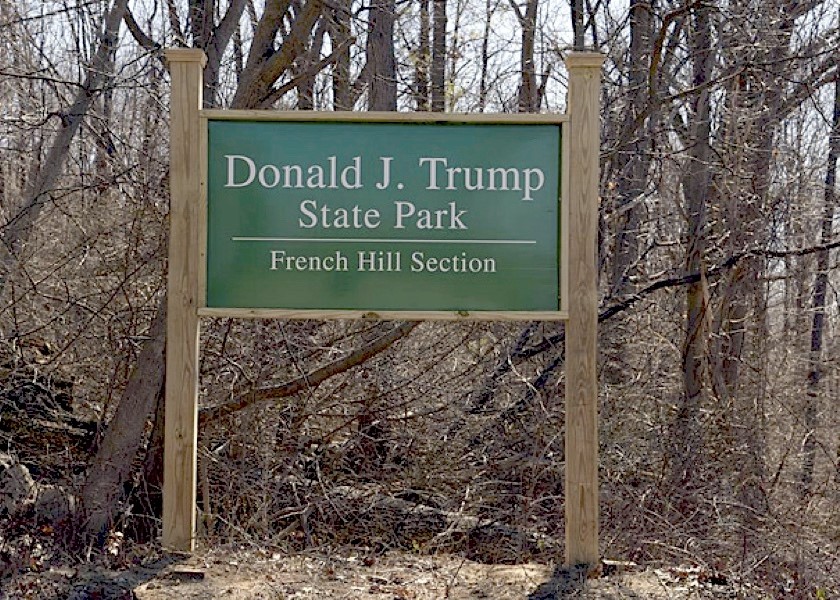
By Kenneth Tiven
In Journalism school, one famous professor always said, “You tell big stories with small pictures.” For a modest glimpse into how President Donald J. Trump, created the impression that he is a smart businessman we find clear evidence 50 miles from Manhattan.
In rural New York, he turned a failed $2,000,000 real estate investment into a $26.1 million dollar tax deduction, using the “loss” to offset any future positive income. He put his name on this deal as you shall learn, but the tax maneuver remained unknown and overlooked for nearly two decades. Now that some of his financial documents are in public view the story can be pieced together.
It is not the Art of the Deal but rather the Art of the Steal.
A wild tract of land—435 acres to exact— is designated Donald J. Trump State Park, an hour’s drive from Trump Tower. How the property became a State-owned park explains Trump’s approach to stretching any law or regulation that hinders his behavior.
It is adjacent to Yorktown Heights, a town with a year-round population of about 2,000 people, but today a magnet for wealthy Manhattanites looking for large “get away from the city” homes, horse farms, and estates.
While technically open, it has been abandoned and ignored by the State Park system because as ramshackle forestland gifted to them it is too expensive to transform. The state focus is on maintaining the nearby Franklin D. Roosevelt Park, named for a New York governor more famous as one of the USA’s most memorable presidents.
In 2000 Trump bought the property to create a golf course, paying $2 million dollars, about $4,590 an acre, which seemed a bargain considering real estate prices than for housing land in the area. Bought without any prior approvals from the towns that controlled zoning regulations, he soon discovered they didn’t want another golf course.
"Just let me build the golf course — I’m rich, you’ll like it,” Donald Trump wrote to Town of Yorktown Heights Supervisor Linda Cooper, an attitude that defines his approach to everything. She warned that the local water supply and access to and from the adjacent Taconic State Parkway were key issues that warranted detailed examination.
Trump, impatient with the environmental review, threatened in a letter to Cooper in 2002 that he would instead sell the property to housing developers. At the time Cooper described Trump as "the bully on the playground... Whether you are a big person or a little person, you have to follow the same rules.” The housing deal never happened.
Trump's reputation then wasn't helping him as this came after he had failed with gambling casinos in Atlantic City. His reality TV career was years ahead. Trump claimed at the time the land was worth $100 million dollars, roughly 50 times what he had paid, consistent with his practice of overvaluing everything he owned when selling it.
In 2006 after five years of waiting for approvals he hatched a plan to contribute his $2,000,000 property to New York State for a park, to create a charitable deduction that would reduce his state and federal taxes. His principal requirement was that his name —the brand—exists at every entrance to the park.
Trump wanted the local officials to raise the assessed value to five times his purchase cost to give him a bigger charitable gift. A real estate expert told this reporter that cannot happen based on the owner’s personal value projections. It would require a valuation from a reliable real estate appraiser. However, for tax filing paperwork, non-cash contributions do not require a valuation although the IRS typically asks for one with a large non-cash item.
However, Bloomberg News reported his 2016 campaign documents listed the value of this charitable contribution as $26.1 million. It isn’t clear what the organization provided a valuation, or if one exists for the donation.
Apparently, Trump donated no funding to actually turn the forestland into a park. Efforts to improve a small section failed because of environmental contamination problems. Faced with statewide budget cuts in 2010 the park was closed and dropped from the register of state parks.
Subsequent renaming discussions are said to irritate Trump, especially one to name it for Pete Seeger, a famous folk singer, pacifist, and anti-fascist beloved for his role in cleaning up the nearby Hudson River. New York ignored a request that the land is returned to Trump.
The latest suggestion is to rename it for the late Supreme Court Justice Ruth Bader Ginsburg, whom Trump couldn’t wait to replace after she died. Surely she deserves a better monument than a Trump hand-me-down that figures in a transaction that explains Trump’s business mantra.